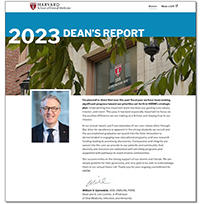
It is well established that periodontitis plays a role in developing numerous diseases and disorders unrelated to oral health. But now, a multidisciplinary team of researchers from Harvard School of Dental Medicine (HSDM), Massachusetts General Hospital (MGH), and São Paulo State University School of Dentistry (UNESP) highlights the potential to improve cancer treatment outcomes and decrease related adverse events by addressing oral dysbiosis.
In a recently published review from “The Lancet Healthy Longevity,” Drs. Fernando Guastaldi (HSDM), Sara Pai (MGH), and Henrique Matheus (UNESP) break down the pathophysiology of periodontitis and its comorbidities to highlight how the oral microbiome can affect immune responses that overlap with immune-related adverse events associated with immunotherapy.
“Given that periodontitis can result in systemic inflammatory disorders, and given the era of immunotherapy in cancer treatment, it just seemed like there may be understudied ways that may be impacting the efficacy of immunotherapy based on oral health,” said Pai, a researcher and clinician in the Division of Surgical Oncology at MGH studying immunotherapy.

The first of which deals with the gut microbiome. As periodontitis progresses in the mouth, the degradation of oral tissue leads to bacteria transferring to the bloodstream and eventually to the gastrointestinal tract. As stated in the review, once P gingivalis infects the gut, a shift in the microbiota occurs there just as it does in the mouth.
Since it has been established that the composition of gut bacteria in patients receiving cancer immunotherapy can dictate their responses to the drug, the research team compared the gut microbiota of immunotherapy non-responders and patients with periodontitis. They found that two bacteria strains, Ruminococcus spp and Prevotella spp, are common in both groups, which suggests that periodontitis could influence cancer immunotherapy responses.
The team found another connection related to receptor pathways targeted in immunotherapy treatment – PD-1 and PDL-1 (two of the main immune checkpoints), as well as C5a and C3A (two complement components), are over-expressed in patients with periodontitis.
“When we were searching about the role of these receptors in immunotherapy, we found some publications saying that if you have a blockage of these receptors, you would have an improved response,” said Matheus, a periodontology researcher at UNESP. “So, what we assumed was if we have an increase of these receptors, the response rates could be lower when you treat these patients.”
Lastly, the team examined the more than 50 systemic inflammatory diseases believed to be linked to periodontitis, many of which overlap with immune-related adverse events associated with immunotherapy.
“We were seeing if the mechanisms through which periodontitis causes heart disease or diabetes could be similar to the ones caused when you have immunotherapy,” Matheus said. “As we found that some of them were really similar, we can assume that if we have both conditions, it may be more likely that the patients would have diabetes or rheumatoid arthritis or myocarditis.”
Putting all of this together, the researchers suggest that the treatment of periodontitis could not only improve the efficacy of cancer immunotherapy but also serve as a non-pharmacological approach to improving overall health and patients’ quality of life.
 “Something as simple as taking care of your teeth can prevent all of these systemic autoimmune disorders,” Pai said. “And then for that to also impact cancer treatment or efficacy, that seems to me like a low-hanging fruit to try to make the patient or person feel better overall.”
“Something as simple as taking care of your teeth can prevent all of these systemic autoimmune disorders,” Pai said. “And then for that to also impact cancer treatment or efficacy, that seems to me like a low-hanging fruit to try to make the patient or person feel better overall.”
Aside from generally potentially improving cancer outcomes, the review suggests that treating periodontitis could reduce cancer disparities among racial and socioeconomic minority groups. Since periodontitis is more common among marginalized groups, those in the community could face poorer outcomes to cancer immunotherapy due to a preexisting condition.
“We hypothesized that managing periodontitis could help to reduce cancer disparities by improving response rates and reducing ICB toxicity profiles in underrepresented minorities and individuals with a lower socioeconomic status,” the authors said in the review.
None of this work would have been possible without collaboration from different medical specialties, according to Dr. Guastaldi, Director of the Skeletal Biology Research Center, Division of Oral and Maxillofacial Surgery at MGH and an Instructor at HSDM.
“On one side Sara has clinical activity and she sees and treats cancer patients, so she has this population within MGH. On the other side, I am an oral maxillofacial surgeon, but Henrique is finishing his PhD in periodontics, so he’s an expert in this,” Guastaldi said. “This is just one example, one initially very successful example, on how these cross-collaborations can benefit patient care.”
Research partnerships like this are important not only for patient outcomes but also for the development of the investigators doing the work.
“This was a life-changing experience,” Matheus said. “This collaboration has widened my horizons. This would never have been possible if I was just doing dental research and not collaborating with other people.”


